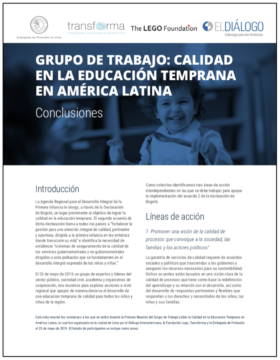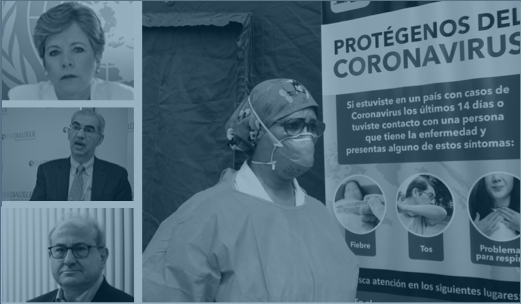
Calidad en la Educación Temprana en América Latina
Informe de relatoría sobre la calidad en la educación temprana en América Latina.
This post is also available in: Español
On April 29, 2020, the Inter-American Dialogue, the Early Childhood Development Action Network (ECDAN) and UNICEF's Regional Office for Latin America and the Caribbean hosted a webinar to reflect on how the Covid-19 pandemic has affected young children and their families and what responses governments in Latin America are organizing to ensure that child development continues to receive the necessary attention. This virtual panel featured Carolina Salgado, advisor in the Presidency for Children and Adolescents in Colombia, Jeanet Leguas, director of Chile Crece Contigo, and Pierina Stivan, coordinator of the Uruguay Crece Contigo (UCC) family support program. This seminar was co-moderated by Ariel Fiszbein, the director of the education program at the Inter-American Dialogue, Shekufeh Zonji, Global Technical Lead at ECDAN and Monica Rubio, Regional Adviser at UNICEF LACRO. This event had over 651 participants join live.
The Covid-19 crisis has affected many sectors and early childhood is no exception. Given the extent of the crisis, representatives of these three countries described the impact of the pandemic on early childhood and shared how programs have been strengthened and implemented in response to the pandemic.
The panelists agreed that the biggest challenge was to continue early childhood services after care centers have closed. Current efforts have focused on greater coordination between the central government and local entities in order to maintain services and detect new cases of children who need to enter protection networks. New and creative ways have been implemented to reach families via phone, video call and/or free call services. After the first stage of the pandemic, where efforts focused on the delivery of basic goods such as food, efforts are now focused on disseminating informative pedagogical/teaching material and games that families can play together to face periods of social isolation. A common challenge has been reaching families in isolated or geographically distant areas.
Carolina Salgado described the areas that Colombia has prioritized under the premise: "taking care of health, protecting life" which is focused on continuing and strengthening programs that were already a part of the government's agenda prior to Covid-19. The current efforts center around home life, with a strategy called "Contact without Contagion". This initiative is focused intensely on health and nutrition. They have been monitoring families through calls and virtual meetings to identify those that need support. They prioritized maintaining vaccine services for newborns and implemented home visits for young children to receive vaccines. In fact, long-distance care services have been established as well as telemedicine to provide services without exposing children. Finally, in relation to online educational material, Salgado emphasized programs that take into account households without internet access by providing them with a portal that does not require internet connection called Colombia Aprende as well as platforms with cultural content including books and music, such as Maguaré.
Jeanet Leguas outlined the challenges of confinement for families in Chile and reported on the increase in calls related to domestic violence. Leguas acknowledged that parents are in an abnormal parenting situation and therefore require more support. She identified a positive side to the pandemic where surveys indicated that children were happy to be with their family twenty-four hours a day. Some parents also emphasized pleasure at being able to witness the first steps of their children. Many had to generate a new dynamic in their homes, which included more involvement of male caregivers. Leguas highlighted general lines of actions that Chile Crece Contigo has taken to address needs like monitoring through phone or video calls and the identification of complex cases via a toll-free telephone line. Phone lines were connected as needed in homes that are a part of the Chile Crece Contigo program. For additional accessibility, all educational materials can be accessed online. Leguas referred participants to look at Chile Crece Contigo's online repositories with links to key services.
Pierina Stivan explained the guidelines of the family support program in Uruguay. Weekly calls have been established with families and regular virtual meetings between technical teams are being conducted. Food and learning materials such as books and pencils have been distributed to families. For workers without technical equipment, cell phones have been provided by the national telephone company and computers delivered by the Ceibal Plan. Other efforts include compiling materials prepared by international organizations and collecting social media resources related to education and parenting which has allowed them to create more materials for the use by families participating in the program. Stivan emphasized that telecare has been critical in monitoring and addressing development and parenting issues.
Prior to the start of the webinar, we asked our audience questions like, what kind of support do families with young children need most urgently in this emergency and what are the main effects that Covid-19's emergency will have on young children and their development. The responses were encoded in two word-clouds presented below.
A round of questions during the webinar, addressed the audience’s concerns regarding: the response to domestic violence, indigenous populations services and monitoring of families in rural or disconnected areas. Leguas presented a new initiative from Chile to respond to domestic violence, which allows those affected to report abuse in pharmacies using a code word. In the case of indigenous populations, Salgado reiterated that many of the materials have been translated into different languages in order to universalize the services in Colombia.
In the Q&A session we heard from some participants including Fanny Montellanos, the executive director of Peru's Cuna Más program. She explained that they have adopted a non-face-to-face community monitoring strategy to 1) identify what was happening with families and to provide relevant information, 2) implement informative communication in order to continue the program’s work and deliver food and games, and 3) explore what and how services that have been lost during the pandemic can be reactivated. Brenda González García from the National Protection System for Children and Youth in Mexico mentioned the increase in cases of domestic violence, including against children. She also commented that the Mexican government's national strategy on early childhood development had just been published in March but many of the services included would have to be re-evaluated due to the pandemic. Josefina Vijil, researcher at the Center for Research and Social Educational Action from Nicaragua, explained that the government made the decision not to act based on global recommendations and not take action against the virus, so there is no data on how the virus has spread on its territory and which schools and public services remain open.
This event is the first of a series of events on early childhood and the Covid-19 crisis, find future events here.
Informe de relatoría sobre la calidad en la educación temprana en América Latina.
This analysis offers a glimpse of the potential impact of the Coronavirus Disease 2019 (COVID-19) pandemic on US immigrants and family remittances. Past events involving worldwide crises can offer insight as to how this pandemic will likely affect remittance transfers. Considering migrants’ financial and health vulnerabilities as well as the forecast recession, a conservative estimate shows that remittances will register a -3 percent decline in 2020 relative to 2019, from $77 billion to $75 billion.
On March 19, the Inter-American Dialogue hosted a conference call with Alicia Bárcena and Santiago Levy. The discussion centered around the consequences of this pandemic for the global economy and the Latin American and Caribbean region in particular.
 Main Photo: Nik Anderson / www.vperemen.com / CC 2.0
Main Photo: Nik Anderson / www.vperemen.com / CC 2.0

 Video
Video